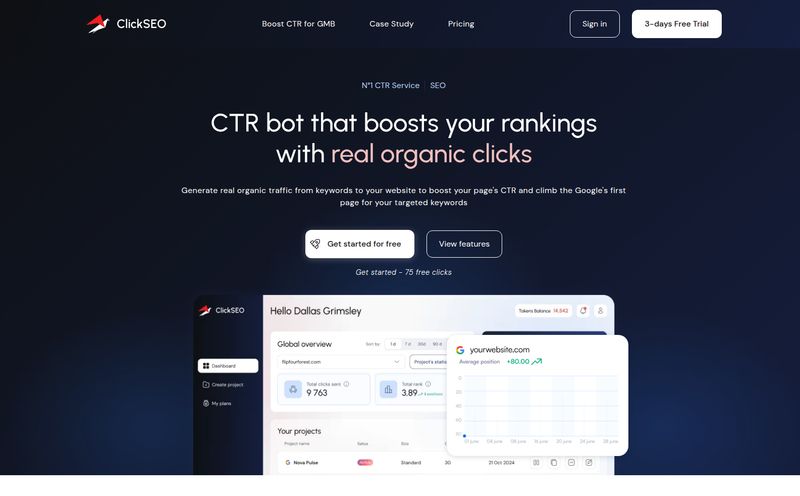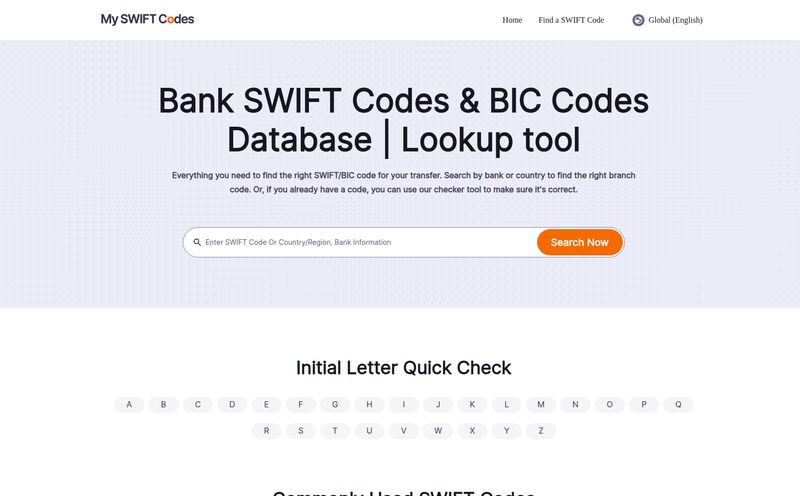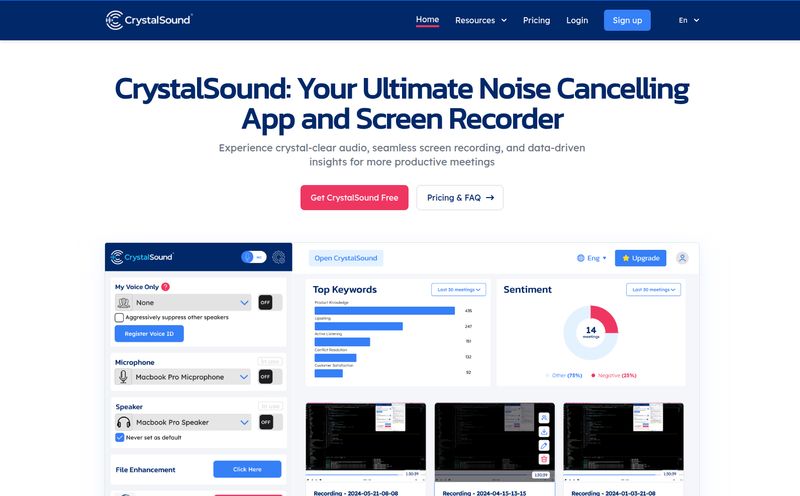Podcasting is a beast. A beautiful, informative, often hilarious beast, but a beast nonetheless. We're living in an era of peak audio, with more content being produced than anyone could ever listen to in a hundred lifetimes. As a content strategist and SEO nerd, I spend a huge chunk of my week sifting through podcasts for client research, finding quotes for articles, and just trying to stay ahead of industry trends. It's a goldmine of information, but finding a specific nugget often feels like trying to find a needle in a... well, a soundstack.
You know the drill. You remember hearing a fantastic point in an episode of The All-In Podcast or a specific marketing tactic mentioned on My First Million, but you can't remember which episode. So you start scrubbing. And scrubbing. An hour later, you're frustrated, no closer to finding it, and you've probably gotten distracted by a completely different topic.
So when I heard about a tool called Sniplet that claims to 'deep search' podcasts, my ears perked up. A Google for podcast audio? Yes, please. I was immediately intrigued and, I'll admit, a little bit excited. This could be a game-changer for my workflow.
What Exactly Is Sniplet Supposed To Do?
The concept behind Sniplet is wonderfully simple and incredibly powerful. Instead of just searching podcast titles or show notes, it aims to search the actual content of the episodes. It uses what I assume is some pretty slick AI-powered transcription to index the spoken word, allowing you to type in a question or a topic and get pointed to the exact moments in various podcasts where it's being discussed.
Think about it. You could:
- Find specific data points: Type "Q3 2024 CPC trends for retail" and find every time an expert mentioned it.
- Discover new shows: Search for a niche topic you're obsessed with and uncover smaller, relevant podcasts you'd never have found otherwise.
- Save massive amounts of time: Go directly to the 1-minute segment you need instead of listening to a 90-minute episode. A real time-saver.
This isn't just about convenience; it’s about making audio content as searchable and accessible as text. That's a huge step forward.
My First Impression (And a Little Tech Glitch)
So, filled with nerdy optimism, I navigated over to the Sniplet website, ready to put it through its paces. And I was greeted with... this.

Visit Sniplet
Womp womp. A 500 error. For the non-tech folks, that's a server-side issue. The message "supabaseUrl is required" is a dead giveaway for developers. It means the application can't connect to its backend database (Supabase is a popular open-source platform for building apps). It's like the cook in the kitchen not having the address for the grocery store.
Now, my first reaction was a sigh. But my second reaction was... understanding. This is the reality of new tech. It’s messy. Things break. Especially with ambitious tools that are likely in an early beta or launch phase. Honestly, seeing this feels more authentic than a perfectly polished landing page for a tool that doesn't work. It's a sign of a product in the wild, with real growing pains. I've been there with my own projects, and I have a soft spot for founders in the trenches. So, while I couldn't test it today, the promise is still there.
The Promise of Podcast Deep Search: Why This Matters
Even though the tool was taking a nap when I visited, lets talk about its potential. A functioning Sniplet could seriously shake things up. For content marketers, this is a dream. We could pull quotes for social media, verify stats for blog posts, and conduct competitor research with shocking efficiency. For instance, I could search for every time a competitor's name is mentioned across the top 100 business podcasts. The insights from that alone would be worth their wieght in gold.
But it's bigger than just marketing. Think about students researching a paper, journalists fact-checking a story, or even just a curious individual wanting to learn about permaculture. The ability to query the vast, unstructured library of human conversation in podcasts is a form of democratizing information.
The Potential Hurdles and Realities
Okay, let's put our skeptic's hat on for a second. Building a tool like this is not easy. There are two massive hurdles Sniplet, or any tool like it, has to overcome.
The Database Dilemma
A search engine is only as good as its index. Does Sniplet have access to every podcast on Apple Podcasts and Spotify? Or just a curated list? For this to be truly revolutionary, its database needs to be exhaustive. If it only searches the top 500 podcasts, its utility is significantly limited for those of us interested in niche industries.
The Transcription Trap
The second, and perhaps more difficult, challenge is the accuracy of the audio transcription. Anyone who's used YouTube's auto-captions knows that AI can get things... hilariously wrong. Things like strong accents, industry jargon, fast-talking hosts, and cross-talk can turn a transcript into gibberish. I once used a tool to transcribe an interview with a Scottish engineer, and it interpreted "knowledge base" as "gnome's face." True story. The quality of Sniplet's search results will live or die by the quality of its transcription AI. It needs to be near-perfect to be reliable.
How Sniplet Could Fit Into Your Workflow
Assuming the team gets that Supabase URL sorted and the tech holds up, I can already picture how this changes things. Let's look at a simple research task.
| Workflow Scenario: Finding Expert Opinions on "AI in SEO" |
|---|
| Before Sniplet |
| 1. Brainstorm podcasts that might cover this (e.g., Search Off the Record, The SEO Podcast). 2. Go to Spotify/Apple, search for episode titles with "AI". 3. Guess which episodes are most relevant. 4. Listen to 3-4 hours of audio, scrubbing through intros and ads, hoping to find a few good quotes. |
| After Sniplet (The Dream) |
| 1. Open Sniplet. 2. Type "How is generative AI changing SEO content strategy?" 3. Get a list of 10 podcast snippets, with timestamps and transcripts. 4. Click, listen to confirm context, and copy the info you need. Total time: 15 minutes. |
The difference is night and day. It transforms a task from a speculative time-sink into a targeted, efficient action.
What's the Price Tag on This Thing?
This is the million-dollar question, isn't it? Currently, there's no pricing information available. Given its current state (the 500 error), it's almost certainly in a free, pre-launch, or beta testing phase. This is pretty standard for new SaaS tools trying to find product-market fit.
My guess? We'll probably see a freemium model emerge. Maybe a free tier with a limited number of searches per month, and then paid tiers for power users, agencies, and enterprise clients who need unlimited searches and advanced features. A price point between $15-$30/month for a prosumer plan would feel about right, depending on the quality and scope of the index.
So, Is Sniplet Worth Watching?
Despite the initial hiccup, my answer is a resounding yes. The idea is too good to ignore. The problem Sniplet is trying to solve is a real, nagging pain point for a massive and growing audience. While the execution is still a question mark, the concept alone is enough to make me bookmark the site and check back in a few weeks.
If they can build a comprehensive index and nail the transcription accuracy, Sniplet won't just be another tool. It will be a fundamental piece of the content discovery puzzle. For now, I'm chalking up the error to early-stage jitters and keeping my fingers crossed. I'm rooting for you, Sniplet team.
Frequently Asked Questions about Sniplet
What is Sniplet?
Sniplet is a specialized search engine designed to perform "deep searches" within the audio content of podcasts. Its goal is to help users find specific snippets, discover new shows, and locate segments relevant to a particular topic or question, rather than just searching titles and descriptions.
How is Sniplet supposed to work?
It likely uses artificial intelligence and machine learning to transcribe the audio from a large database of podcasts. This creates a searchable text index of the spoken content, allowing users to query it just like they would a text-based search engine like Google.
Is Sniplet free to use?
As of late 2023, there is no public pricing information. The tool appears to be in an early beta stage, which typically means it is free to use during this development and testing period. A pricing model might be introduced later.
Who would find Sniplet most useful?
It has broad appeal, but would be particularly useful for content creators, marketers, journalists, researchers, and students who need to find specific information within audio content efficiently. Avid podcast listeners who want to skip to the most relevant parts of episodes would also benefit.
How accurate is a podcast search tool like this?
The accuracy depends heavily on two factors: the comprehensiveness of its podcast database and the quality of its AI transcription technology. Challenges like accents, technical jargon, and poor audio quality can affect the precision of the search results.
Reference and Sources
For more on the challenges of automated transcription, you can read insights from leaders in the space, such as the official blogs for services like Rev or Otter.ai, which often discuss the nuances of AI transcription accuracy.
Information regarding the Supabase platform can be found on their official website: supabase.com.



